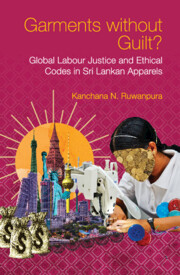Book contents
- Frontmatter
- Dedication
- Epigraph
- Contents
- List of Tables, Figures and Images
- Preface and Acknowledgements
- Published Works and Funding
- List of Abbreviations
- 1 Introduction: Global Labour Justice via Ethical Codes?
- 2 Labouring for Apparels: Labour Geographies and Feminist Inflections
- 3 Fieldwork: Prolonged Phases and Multiple Moments
- 4 Clothing the World – Guilt Free? Sri Lanka’s Apparel Landscape
- 5 Neglected Labour Histories: The Sri Lankan State Responds to Labour
- 6 Ethicality with a Blind Eye? Ethical Code Practices at Production Sites
- 7 From War to Work: Ethicality amidst Post-War Trauma?
- 8 Concluding Thoughts: Grounded Governance?
- Appendix
- References
- Index
6 - Ethicality with a Blind Eye? Ethical Code Practices at Production Sites
Published online by Cambridge University Press: 15 December 2021
- Frontmatter
- Dedication
- Epigraph
- Contents
- List of Tables, Figures and Images
- Preface and Acknowledgements
- Published Works and Funding
- List of Abbreviations
- 1 Introduction: Global Labour Justice via Ethical Codes?
- 2 Labouring for Apparels: Labour Geographies and Feminist Inflections
- 3 Fieldwork: Prolonged Phases and Multiple Moments
- 4 Clothing the World – Guilt Free? Sri Lanka’s Apparel Landscape
- 5 Neglected Labour Histories: The Sri Lankan State Responds to Labour
- 6 Ethicality with a Blind Eye? Ethical Code Practices at Production Sites
- 7 From War to Work: Ethicality amidst Post-War Trauma?
- 8 Concluding Thoughts: Grounded Governance?
- Appendix
- References
- Index
Summary
India, Pakistan, Sri Lanka and Bangladesh
have similar labour laws – which stem from the
British colonial period. With the exception of Sri Lanka,
what we have witnessed in the other countries in the past decade
is a process of circumventing these laws and a
greater informalization of the labour market.
Sri Lanka has been an exception because the human and
social development levels have been high and have a greater voice,
which comes along with strong human and social development
—Senior officer, UNDP regional officeIntroduction
Commentators often portray the Sri Lankan apparel industry as visionary, giving industrialists credit for pursuing an ethical and niche-market production strategy. In Chapter Five, I attempted to puncture this storyline to reveal its partiality – since the rendering ignores how labourers have held the state culpable for violating their rights. Early collective struggles led to general legislative frameworks that continue to offer workers some recourse, and resistance by apparel sector workers in particular helped shape work conditions within that sector from the late 1980s (Kearney 1971; Jayawardena 1972; Women's Centre 2006; Biyanwila 2011; Saxena 2014). When a senior officer at the United Nations Development Programme's (UNDP) regional office shared the above sentiments, she was capturing another dimension to Sri Lankan apparel's successful ethical trajectory: that of the voice and place of labour, enabled by social and human development factors, as well as by labour legislation.
By the time ethical trade practices were promoted via global governance initiatives, the apparel sector in Sri Lanka was poised for success due to reasons beyond that of management vision. From the 1980s, workers had compelled the Sri Lankan state to respond to their concerns regarding working conditions and rights, often endangering their lives in doing so. The global move to implement voluntary codes of conduct barely caused a squeak, because Sri Lanka was already ahead of the game (Ruwanpura and Wrigley 2011). In a country and sector that had achieved this lead, and where workers had greater voice, what were work conditions like within production sites?
I now turn to an examination of ethical codes at production sites. I return to my located ethnography and long-term field research to tease out the nuances in the media narratives that often describe Sri Lankan factories in terms of extremes – either as idyllic spaces or as exploitative ones.
- Type
- Chapter
- Information
- Garments without Guilt?Global Labour Justice and Ethical Codes in Sri Lankan Apparels, pp. 95 - 123Publisher: Cambridge University PressPrint publication year: 2022



